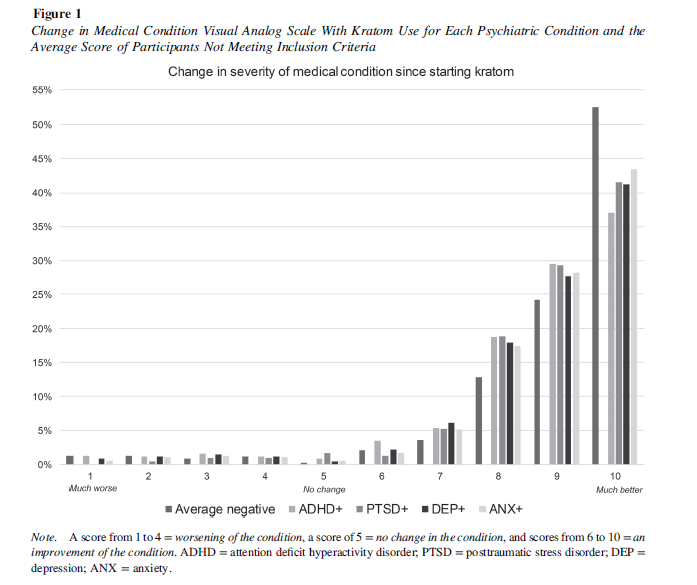A survey conducted from 2019-2020 found the majority of the 2,296 respondents with psychiatric conditions reported improvement in their condition following the consumption of kratom. On a scale of 1 to 10, 1 being “much worse” and 10 being “much better”, most people who use kratom (PWUK) who have been diagnosed with ADHD, PTSD, depression, or anxiety ranked their condition a 10, or much better after they started to use kratom.

As in past surveys, researchers found most respondents were white, middle aged, college educated, and employed. Males made up 51% of the respondents who met the inclusion criteria for a psychiatric condition. While there were respondents from multiple nations, 96% were from the US and Canada.
Only 8% of respondents consumed kratom for less than 6 months. The majority of respondents, 37%, fell in the 2-5 year range.
The majority of respondents consumed 1-3 grams of kratom per dose. A majority reported dosing 3 times per day. This seems to correspond with our own observation and experience with PWUK: 3 grams of kratom per day would be the low end of a moderate dose, while 9 grams per day (or 3 grams, 3 times per day) would constitute the upper end of a moderate dose.
A considerable amount of PWUK take what can be considered high amounts per day, with 25.1% reporting more than five grams per dose, and 22.1% reporting dosing four or more times per day. This highlights the importance of testing kratom for toxic levels of heavy metals. Referring to a study he conducted on metals in kratom products, Dr. Walt Prozialeck told Kratom Science, “With levels of like 10 grams a day ingestion, for some of the products, [that] would exceed the allowable daily intake of toxic metals, particularly lead [Pb]. So there were a few of the products that I was really concerned about.” Another concern is that Americans consume doses at larger amounts than have been traditionally consumed, which may account for rare adverse effects experienced in the West that are virtually unheard of in the East.
Respondents also reported use of other substances prior to or concomitant with kratom. Among the most popular substances, 15-19% percent of PWUK across psychiatric conditions also use cannabis, 13-15% use CBD, and 7-8% use benzodiazepines. Researchers expressed concern that while PWUK report “perceived therapeutic benefit”, and reduced consumption of other drugs, polydrug use with kratom “may produce or exacerbate adverse effects.”
For beneficial effects, a majority of respondents reported increased energy, reduced depression, and reduced anxiety. A majority of respondents with PTSD reported reduced PTSD symptoms and reducing or stopping the use of opioids. A majority of respondent with depression reported improved sleep. Only two respondents reported no positive or beneficial effects.
The most commonly reported detrimental effects were nausea (21-29% across psychiatric conditions), constipation (19-28%), stomach upset (9-12%), and dizziness or drowsiness (9-12%). Only three respondents reported no detrimental effects.
The authors reported limitations including inherent positive bias in self-reporting, and the likelihood that those who had negative experiences with kratom avoid participation in kratom surveys or in some of the online spaces where the survey was advertised.
Grundmann, et al. conclude:
Ultimately, kratom seems to consistently present as a self medication strategy for psychological disorder symptoms but with fewer reported detrimental effects than traditional drugs of abuse. Indeed, kratom seems to be reducing use of some such drugs of abuse. However, any possible protective effect of kratom needs to be confirmed with safety and tolerability studies, clinical trials, and randomized-controlled trials.
Reference
Grundmann, O., Veltri, C. A., Morcos, S., Smith, K. E., Singh, D., Corazza, O., Cinosi, E., Martinotti, G., Walsh, Z., &
Swogger, M. T. (2023, January 12). Correlations of Kratom (Mitragyna speciosa Korth.) Use Behavior and Psychiatric
Conditions From a Cross-Sectional Survey. Experimental and Clinical Psychopharmacology. Advance online publication.
https://dx.doi.org/10.1037/pha0000632

Cured my depression and lack of motivation for about 2 years and then stopped working:-(
Kratom is an amazing plant. It saved my life after I was diagnosed with ptsd and depression please make sure consumers like me have the right to safe herbal remedies